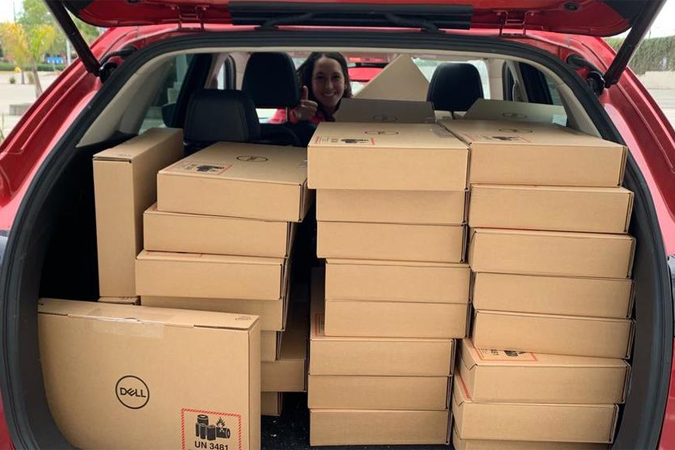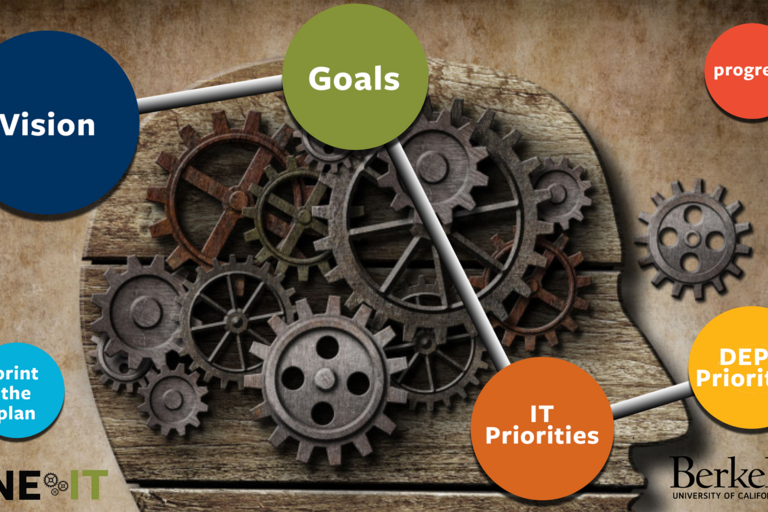Progress made on goals and priorities outlined in our Reimagining IT Strategic Plan this year in addition to supporting new technology during COVID
-
SIS Phase 2- Began transitioning the Student Information System (SIS) to the PeopleSoft Fluid Navigation Framework to make navigation more seamless and intuitive for all users. Delivered additional functionality as requested by partners to further enhance the effectiveness, stability, and performance of SIS, CalCentral, and associated third-party systems. Began planning transition to SIS Operations in June 2021.
-
Student Advising Support- Enabled academic and other campus advisors to support the success of all students more effectively by creating innovative programming to support advising across campus and the Advising Council. Developed tools to support their work, including bringing together the necessary underlying data from bCourses and other student systems for new applications.
-
Student Computing @ Cal - Successfully completed this project in June 2020. Major milestones reached during its final year included: the addition of a second drop-in student tech help desk location in Eshleman Hall; assumption of Tier 1 CalNet support for students; and significant redesign of the Student Tech Services website to include more resources related to remote instruction.
-
Secure Research Data and Computation - Supported faculty, students and postdocs working with sensitive data by providing consulting expertise and coordinating efforts among the campus offices that are involved in reviewing data use agreements and security plans.
-
Data Science Tools and Infrastructure - Partnered with the Data Sciences division to facilitate the broad adoption of innovative data analysis tools for students, making them readily available to any instructor by the end of spring 2020.
-
Next Generation Wi-Fi - The goal of this project has been to improve the density and capacity of our Wi-Fi network and expand coverage for the campus. Since starting the project in 2017, 3,000+ access points have been added in redesigned spaces and 2,000+ obsolete access points have been replaced, primarily in academic buildings across campus. The project is now on hold as FY21 funding for Wi-Fi improvements were not approved.
-
Security IS-3 - The Information Security Office completed phase 1 of the IS-3 Implementation Plan. This included: updating processes, systems, and policies to align UC Berkeley security standards with UC system-wide requirements, developing assessment tools, and completing a pilot program for several campus units involving numerous risk assessment surveys.
-
Launch Cloud Management and Container Platforms - We developed a cloud management platform (CMP) for both on premise self-service private cloud and integration with public cloud and a service to deploy Kubernetes clusters for campus that will support our campus cloud strategy and the Data Science Program. Key accomplishments include enabling and enhancing a centralized Amazon Web Services (AWS) payer account; consolidating over 20 sub accounts and providing the sub accounts with a 13% discount off their AWS bill; worked to establish a foundational infrastructure within Google Cloud Platform (GCP), which will enable us to launch Kubernetes as a service. Kubernetes is an open-source container-orchestration system for automating computer application deployment, scaling, and management.
-
Open Access - The goal of this priority is to accelerate the Library's ongoing effort to make the products of UC research and scholarship as freely and widely available as possible through open access. The Library successfully launched its Digital Collections portal, which features over 300 digital collections with over 180,000+ items available to anyone, anywhere at anytime for their research and teaching. Additionally, building on the university’s commitment to find ways to work with publishers of all types and sizes to make UC scholarship and research mode widely available, UC has reached agreements with native open access publisher JMIR (Journal of Medical Internet Research) and society publisher ACM (Association for Computing Machinery) to provide financial support for UC researchers who choose to publish open access. Agreement with Cambridge University Press has also been fully implemented, enabling UC authors who publish with Cambridge to make their research freely available to the world to read. The agreement also maintains UC’s access to Cambridge’s more than 400 journals.
-
Enterprise Data Lake - A trove of student data was introduced to the Enterprise Data Lake which is being harnessed by Research, Teaching and Learning for student analytics by the Berkeley Online Advising tool. Online advising has been especially important during remote spring and fall 2020 instruction. In addition, the Enterprise Data Lake is allowing campus to quickly consolidate data to respond to unanticipated analytic needs in response to COVID-19. Virus testing, contact tracing, environmental compliance and building access data stored in the lake are being presented via public and executive dashboards to aid campus decision makers in navigating the pandemic.
-
Regional Service Model Tools - In support of Berkeley Regional Services and their campus customers, the Enterprise Applications team has completed initial work to upgrade ServiceNow to provide automation tools and improved data tracking and communication, and continued to improve the Regional Portal to provide critical staff information to supervisors.
-
Smart Campus - This year we explored the smart campus concept, identified opportunities for UC Berkeley, and proposed a roadmap for pursuing. The initiative launched as the Berkeley Connected Campusand employs a campus-wide collaborative approach to select a smart curb management pilot for the busy Bancroft Corridor with Parking & Transportation, Machine learning predictive maintenance sensors with Facilities, and two projects with Environmental Health & Safety introducing PM2.5 air quality sensors and SmartCover stormwater and sanitary sewer sensors. These projects have already benefited campus, enabling preventative maintenance, cost avoidance, data driven decisions and accurate on-campus air quality measurements during wildfires. Watch video from the Fall Technology Innovation Forum



